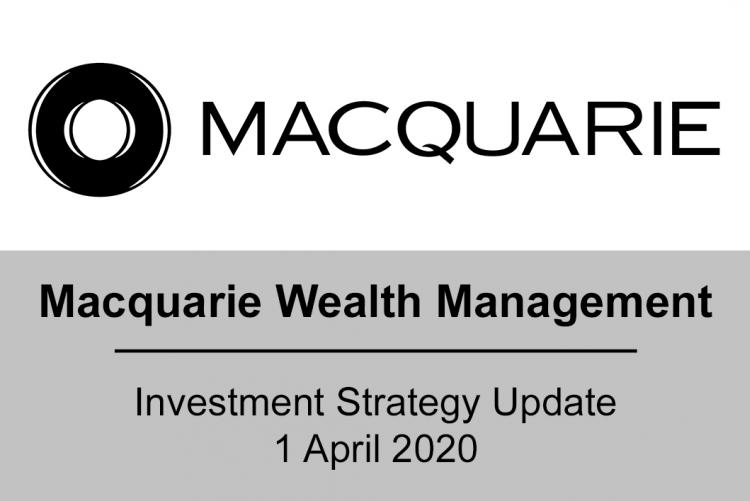Dividend decline will be temporary – stay patient
![Macquarie Wealth Management [04012020] - Chart 01 Macquarie Wealth Management [04012020] - Chart 01](https://www.opwm.com.au/sites/default/files/Macquarie%20Wealth%20Management%20%5B04012020%5D%20-%20Chart%2001.jpg)
The coronavirus is driving a perfect storm for all types of investors. Those focused on capital appreciation have suffered as risk assets have been subjected to one of the fastest bear markets in history. Those focused on yield are also about to suffer as the outlook for corporate earnings signals a decline in dividends is on the way.
![Macquarie Wealth Management [04012020] - Chart 02 Macquarie Wealth Management [04012020] - Chart 02](https://www.opwm.com.au/sites/default/files/Macquarie%20Wealth%20Management%20%5B04012020%5D%20-%20Chart%2002.jpg)
We see little way to avoid a hit to income from a pending decline in dividends. This is because very few stocks will be immune to the economic growth slowdown, either domestically or via international linkages. Even traditionally defensive areas such as infrastructure, property, telco’s and toll roads will be hit by the economics of a “sudden stop”. Add in the banking sector which is in the midst of performing national duty - at a not insignificant cost to earnings and future dividends – and investors will be hard pushed to avoid some drag to pre-corona income levels.
However, dividends will bounce back although it might take some time as corporates rebuild cash buffers. Similarly, the potential to set a more conservative payout ratio as a result of uncertainty around the outlook could impact how quickly corporates revert to historic payment levels. Parallels with the GFC are likely to be made and it provides a reminder of the scale that dividends can decline (in some cases more than 50%), but encouragingly, wedon’t see many similarities unless the duration of the current slowdown is longer than expected and it drives significant equity dilution (as firms are forced to raise capital). But this is not our central case.
We think the easy way to generalize on the dividend outlook is to simply assume that any corporate who removes guidance and/or lowers guidance is at risk of a dividend cut. Several companies will go further by suspending dividends to preserve capital. There will be safety in numbers as the sheer breadth of stocks who are likely to cut dividends provides some degree of air cover. In this regard, corporates are unlikely to let a good crisis go to waste. Over the following pages we answer 4 key questions that are relevant for income seeking investors at present.
#1: What has happened to the yields across different asset classes post the onset of the crisis?
Income levels from equities and other traditional income assets (such as REIT’s) are in the process of being downgraded as companies get hit with a hard stop to revenues. We believe there is near term downside risk to income (yields) across all key asset classes, except for Investment Grade Fixed Income (where we think risk adjusted spreads are now attractive) as well as cash (where deposit rates are actually rising).
![Macquarie Wealth Management [04012020] - Chart 03 Macquarie Wealth Management [04012020] - Chart 03](https://www.opwm.com.au/sites/default/files/Macquarie%20Wealth%20Management%20%5B04012020%5D%20-%20Chart%2003.jpg)
Direct Equities and Property are expected to suffer the largest declines in yields over the coming half due to the immediate hit to earnings and in some cases, already extended payout ratios. While we expect some further dilution from equity capital raisings, this is not a balance sheet crisis and we do not expect this to be pervasive like in the global financial crisis.
REIT’s have seen the most significant change in their income producing ability as containment efforts have added to structural consumer weakness across the sector. We expect many REIT’s to cut 2H20 dividends altogether which removes a substantial attraction. Ultimately, there will be opportunities with many REITs now trading at large discounts to asset backing, but we need more visibility on the duration of the lockdown to gain conviction on where dividends will settle.
High yield fixed income spreads have moved aggressively wider over the last few weeks. However, we believe when adjusted for default risk, this drops to just above 3% (vs market implied 4%).
#2: What should be expected for the yield on a balanced portfolio?
Based off current market expectations the yield on a ‘typical’ balanced portfolio (65% growth/35% defensive split) is currently around 3.3%. However, adjusting for the expected decline in yield across various asset classes, we expect this yield to fall to only ~2.3% (this is a 33% decline in income levels). The high proportion allocated to equities coupled with the hit to expected dividends accounts for the bulk of this 1% decline.
![Macquarie Wealth Management [04012020] - Chart 04 Macquarie Wealth Management [04012020] - Chart 04](https://www.opwm.com.au/sites/default/files/Macquarie%20Wealth%20Management%20%5B04012020%5D%20-%20Chart%2004.jpg)
#3: What has happened / can be expected to happen to the yield on stocks?
Dividends expectations are being rapidly wound back as companies withdraw earnings guidance. How far can dividends fall? Recent declines don’t provide much guidance. During the GFC it was financials and REITs driving the dividend cuts while in 2015/16 it was the commodity producers. This time almost every sector is in the crosshairs. Consensus dividend estimates have already declined 10% since last year’speak. A peak to trough decline of at least 20% appears likely given the hit to financials, infra and REITs. We think dividend payments have likely peaked and are unlikely to recoup previous levels (boosted by resources) for several years.
![Macquarie Wealth Management [04012020] - Chart 05 Macquarie Wealth Management [04012020] - Chart 05](https://www.opwm.com.au/sites/default/files/Macquarie%20Wealth%20Management%20%5B04012020%5D%20-%20Chart%2005.jpg)
At the sector level we believe bank earnings are in structural decline and dividends will follow until a stable (through the cycle) payout ratio is achieved. We think this is below current levels and this is reflected in further bank dividend cuts out through 2021/22.
The resources sector has paid huge dividends (including specials) in recent years boosted by divestments and strong commodity prices. However, operational risks from Covid-19 are now emerging at mining sites and we would not be surprised if the large miners opt to hold onto more cash in the current environment.
At present, analysts are still in the process of lowering 2H20 and 1H21 dividends and we expect further downside in 2020 and 2021 estimates. Forecasts still show rising dividends (ex-resources) into FY21 with most companies expected to resume dividend payments at previous levels.
![Macquarie Wealth Management [04012020] - Chart 06 Macquarie Wealth Management [04012020] - Chart 06](https://www.opwm.com.au/sites/default/files/Macquarie%20Wealth%20Management%20%5B04012020%5D%20-%20Chart%2006.jpg)
We believe this will likely prove too optimistic and investors should expect current dividend trends to be lowered in coming months. Corporates will want to rebuild cash levels and fortify balance sheets following the crisis. The duration of Covid-19 will determine whether capital raisings are necessary but at this stage we think they will remain selective. We think investors should prepare for a gradual recovery in dividends rather than a quick snap-back.
We highlight some of the largest revisions to dividend expectations in the following table. In the current market we view essential services as the safest yield plays. Consumer staples (food), utilities (electricity, gas, mobiles / internet) and healthcare all remain crucial even in a lockdown scenario.
![Macquarie Wealth Management [04012020] - Chart 07 Macquarie Wealth Management [04012020] - Chart 07](https://www.opwm.com.au/sites/default/files/Macquarie%20Wealth%20Management%20%5B04012020%5D%20-%20Chart%2007.jpg)
Our preferences are Coles (COL), Telstra (TLS), Spark Infrastructure (SKI), APA Group (APA) and Sonic Healthcare (SHL). While we would typically emphasise dividend growth, we don’t think this is realistic in the current market with yield stability a greater focus for investors until clarity on the growth slowdown and the recovery trajectory are better understood.
![Macquarie Wealth Management [04012020] - Chart 08 Macquarie Wealth Management [04012020] - Chart 08](https://www.opwm.com.au/sites/default/files/Macquarie%20Wealth%20Management%20%5B04012020%5D%20-%20Chart%2008.jpg)
#4: What are the best asset class income/yield options?
Prior to the coronavirus, our preference for income/yield was REIT’s over Equities over Fixed Income. This was driven by a combination of absolute and relative yield attraction as well as sustainability and growth potential of yield in REIT’s and Equities versus Fixed Income. Like most, we did not foresee the magnitude of the hit from the coronavirus and hence how the earnings collapse would drive substantially lower dividends. Recent events have altered our pecking order and driven a rapid reset for any investor who was reliant on these traditional sources for income.
We believe equities retain a strong attraction for income seeking investors given the yield spread over cash and bonds at 3.6% and 2.7% respectively. Admittedly, growth assets (equities) are likely to undershoot their near-term income goals. However, we do not recommend chasing higher yielding assets to offset a near term income decline. At present, the trade-off for higher yield is higher concentration risk and we do not believe investors should be forgoing the benefits of diversification within an equity portfolio in order to increase yield.
However, as a result of recent events, equities have moved up the pecking order to our #1 spot for income seeking investors on the proviso they can get broad portfolio exposure. While equities might not offer the highest absolute yield, we are more comfortable that broad sector exposure can minimize the risk of further dividend disappointment at an individual stock level as well as offsetting a staggered reintroduction of dividends into the future. The chart above illustrates Australian equities can still yield 4% after assuming a significant cut to dividends and a lower payout ratio. Adding franking credits lifts this yield to ~5% for the S&P/ASX 200.
Listed Property & Infrastructure come next and are also attractively priced with a 5% forecast yield after assuming dividend cuts. REITs have featured prominently in ‘yield’ portfolios but unfortunately, corona virus containment efforts have compounded structural pressures that were already evident across large parts of the listed REIT’s space by cutting foot traffic to near zero. Several high-profile names in the property sector have already withdrawn guidance, putting expected dividends at substantial risk. Unfortunately, we don’t see a fast exit from these conditions for REITs and think the reset back to more normalized dividend levels will not be instantaneous.
![Macquarie Wealth Management [04012020] - Chart 09 Macquarie Wealth Management [04012020] - Chart 09](https://www.opwm.com.au/sites/default/files/Macquarie%20Wealth%20Management%20%5B04012020%5D%20-%20Chart%2009.jpg)
Key investment takeaways:
- Dividend cuts will be temporary and will normalize once corporate cashflows begin to recover.
- We do not recommend adding additional equity exposure to supplement income at present. This is because the decline in dividends is widespread.
- Traditional income safe havens (i.e. REIT’s) are also under pressure due to government driven containment efforts. Investors should remain patient and not seek to sell REIT allocations given the crisis should prove transitory and the yield premium to cash and bonds remains solid.
- The sell-off has shown hybrids are more like equity than fixed income securities. Provided investors have allocated hybrids appropriately within their portfolio, there are selected issues where yields are now tempting for income investors seekers.
- Fixed income yields have collapsed due to rising growth concerns and aggressive monetary policy actions. We don’t expect yields to increase for some time. However, fixed income still provides strong diversification benefits. We think investment grade fixed income is now attractive on a risk adjusted basis.
Jason and the Investment Strategy Team
_______________________________________________________________________________________________________________

